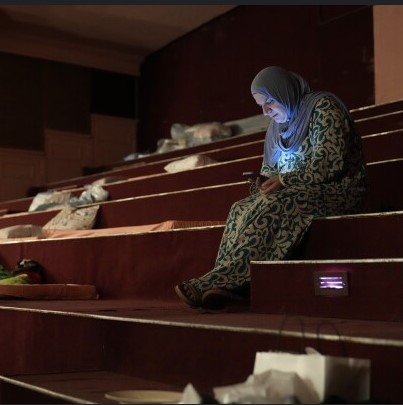In the heart of Beirut, what was once a lively cinema, now serves as a shelter for displaced families. Inside this historic building, dozens of Lebanese, Palestinians, and Syrians, forced from their homes by the ongoing conflict, are making the best of their difficult circumstances. They spend their days following the news on their phones, cooking simple meals, chatting with one another, and wandering around to pass the time. This cinematic space has transformed into a refuge for those seeking safety from the violence outside.
Hamra Street: A Hub of Displacement and Shelter
Outside, the once-thriving Hamra Street has changed dramatically. Displaced individuals now crowd the sidewalks, which once bustled with shoppers and diners. People fill hotels and apartments to capacity as they search for shelter. Cafes and restaurants overflow with patrons seeking a moment of normalcy in the increasingly chaotic environment.
The influx of displaced people has provided a surprising boost to this commercial district, which has struggled in recent years due to Lebanon’s economic crisis. Local businesses, once facing closure, are experiencing a surge in customers. A hotel manager, who prefers to remain anonymous, noted that his establishment saw a spike in occupancy shortly after the conflict intensified. However, he also pointed out the challenges this sudden influx has brought. Traffic congestion has increased, with double parking and scooters cluttering the sidewalks, making it difficult for pedestrians to navigate. The tension between displaced individuals and long-time residents often escalates, highlighting the strain on community resources.
Hamra Street has historically reflected Lebanon’s turbulent political climate. During the golden years of the 1960s and early 1970s, it was a glamorous destination filled with theaters, cafes, and upscale shops. However, decades of instability have taken their toll. The civil war that ended in 1990, and the Israeli invasion in 1982, left scars on the community. In recent years, the arrival of Syrian refugees fleeing their country’s devastating war and the ongoing financial collapse of Lebanon have further complicated the landscape.
The Impact of Recent Conflict
In September, Israel significantly escalated its attacks in Lebanon, leading to a humanitarian crisis. Reports indicate that nearly 500 people were killed in one day, with over 1,600 others wounded. This violent surge prompted a mass exodus from southern Lebanon, the eastern Bekaa Valley, and Beirut’s southern suburbs. Many sought refuge in public squares, beaches, and on the streets, as they fled the relentless bombardment. Official figures reveal that over 2,574 people have lost their lives in Lebanon over the past year due to the conflict, with more than 12,000 injured, and around 1.2 million people displaced.
As displaced families flock to Hamra, they find a cosmopolitan and diverse environment. Many have moved in with relatives or friends, while others have turned to hotels and schools repurposed as shelters. Some families, however, have taken desperate measures, occupying empty buildings, only to be confronted by security forces and removed from the premises.
The unexpected rise in displaced individuals has sparked a mix of reactions among local business owners. Some, like a member of the Hamra Traders Association, observed that certain shops had been on the brink of closure before the influx. The sudden demand has allowed some traders to increase prices, leading to accusations of price gouging amid the crisis. A cellular shop owner reported a 70% increase in sales during the first weeks, with many purchasing phone chargers and internet data to stay updated on the news.
Sales of everyday items, such as underwear and pajamas, skyrocketed as families fled with minimal belongings. A local boutique owner reported a 300% increase in these specific sales, highlighting the urgent needs of those who have lost everything.
A Historic Cinema Transformed into a Shelter
The Le Colisee cinema, a 60-year-old landmark on Hamra Street, had been closed for over two decades before being revitalized earlier this year. The Lebanese National Theater founder transformed it into a shelter for families displaced by the conflict. This initiative reflects the community’s solidarity and resilience in the face of adversity. In recent days, displaced individuals have been seen resting on thin mattresses in the cinema, checking their phones, reading, and even assisting with renovations.
The humanitarian response to the crisis demonstrates the community’s commitment to supporting those in need. The cinema, once a place for entertainment, has become a vital space for refuge. Those sheltering there often share their stories of loss and survival, creating a new community bond amidst the chaos.
Displaced families, like those who fled from Tyre, share harrowing accounts of their experiences. After fleeing a rocket attack, they found temporary shelter, only to be forced to leave when it was revealed that they were not Lebanese citizens. This reflects the harsh realities many face as they navigate their new lives amid conflict and uncertainty.
This historic cinema continues to provide shelter, embodying the resilience of the community. It stands as a symbol of a society grappling with the consequences of war and displacement. The struggle for safety and stability is a constant reminder of the human toll of conflict. Despite this, communities find ways to adapt and support each other in these challenging times.





